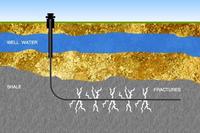-
Hurricane Sandy offered support for reliance on nuclear power
A Scientific American writer is impressed with the way nuclear power facilities were able safely to withstand the wrath of Hurricane Sandy; the lesson he draws from this experience: “Global warming is increasing the probability and destructiveness of extreme weather events like Sandy. (I don’t see the point of dithering over this claim any more.) The last thing we should do in the face of this threat is abandon nuclear energy. If anything, we need more nuclear power, not less, to curb global warming”
-
-
Fracking: fact vs. fiction

In communities across the United States, people are hearing more and more about a controversial oil and gas extraction technique called hydraulic fracturing — aka, hydro-fracking; controversies pivot on some basic questions: Can hydro-fracking contaminate domestic wells? Does it cause earthquakes? How can we know? What can be done about these things if they are true? Experts making presentations at the Geological Society of America (GSA) meeting this week in Charlotte, North Carolina, will address these and related critical questions
-
-
Study supports move toward common U.S. math standards
A new study analyzing the previous math standards of each state provides strong support for adoption of common standards, which U.S. students desperately need to keep pace with their counterparts around the globe
-
-
Obama, Romney differ on major homeland security issues

Tomorrow, Tuesday 6 November, American voters will choose between Barack Obama and Mitt Romney as the next president of the United States; the state of the U.S. economy and the best ways to reduce unemployment and increase the pace of economic growth were at the center of the campaign, leaving little room for other issues. Homeland security issues, in particular, played little, if any, role in the campaign or in the three debates between the presidential candidates and the debate between the vice-presidential candidates; still, if we examine the policy proposals each candidate has made, and also examine the details of policies posted on his Web sites, the differences between the candidates’ approaches on three major homeland security issues – immigration, cybersecurity, and infrastructure – are considerable
-
-
States, localities to assume more responsibilities for rebuilding U.S. aging infrastructure
Infrastructure in the United States is in bad shape; Maryland needs more than $100 million a year for its bridges; Virginia needs $125 million per year for roads that need repaving; Washington’s failure to create a long-term funding plan to repair the nation’s infrastructure is forcing state and local governments to fill the void in federal funding
-
-
Sandy in perspective
Hurricane Sandy has left death and destruction in its path, and it broke a few records, but there were worse hurricanes; since 1900, 242 hurricanes have hit the United States; if Sandy causes $20 billion in damage, in 2012 dollars, it would rank as the seventeenth most damaging hurricane or tropical storm out of these 242; the Great Miami Hurricane of 1926 tops the list; Hurricane Katrina ranks fourth; from August 1954 through August 1955, the East Coast saw three different storms make landfall — Carol, Hazel, and Diane; each, in 2012, would have caused about twice as much damage as Sandy
-
-
Experts: German nuclear exit offers economic, environmental benefits
Following the accident at the Fukushima Daiichi Nuclear Power Station in 2011, the German government took the nation’s eight oldest reactors offline immediately and passed legislation which will close the last nuclear power plant by 2022; this nuclear phase-out had overwhelming political support in Germany; elsewhere, many saw it as “panic politics”; a new collection of studies shows that the nuclear shutdown and an accompanying move toward renewable energy are already yielding measurable economic and environmental benefits
-
-
Rising sea levels make NYC vulnerable to more frequent, more intense floods
Scientists say that Hurricane Sandy has forced a recognition on New York City and on other coastal communities: the steady rise in sea levels means not only more floods, but more frequent and more devastating floods; three of the top 10 highest floods at the Battery since 1900 happened in the last two and a half years; after rising roughly an inch per decade in the last century, coastal waters in New York are expected to climb as fast as six inches per decade, or two feet by midcentury; the city is exploring a $10 billion system of surge barriers and huge sea gates
-
-
DHS grants help Kansas Law enforcement agencies buy new equipment
DHS grants help local law enforcement agencies fight crime more effectively, but according to some, those same agencies are bypassing military grade surplus equipment for brand new shiny toys
-
-
Calculating the benefits of switching from food to energy crops
Along with the growing interest in biomass energy crops as renewable alternatives to fossil fuels comes a growing list of questions from corn and soybean farmers about what it will cost them to switch; researchers developed a customizable online calculator to eliminate some of the guesswork and help farmers make the decision
-
-
Death, destruction in wake of Hurricane Sandy
Hurricane Sandy’s left millions along the U.S. East Coast without power or mass transit, in all likelihood for days; the U.S. death toll reached 48, with most of the dead being killed by falling trees; the hurricane cut power to more than 8.2 million across the East Coast; airlines canceled more than 15,000 flights; Sandy will end up causing about $20 billion in property damage and $10 billion to $30 billion more in lost business, making it one of the costliest natural disasters on record in the U.S. history
-
-
DOD faces shortfall in quality STEM workers; overhaul of recruitment policies needed
The principal challenge for the U.S. Department of Defense’s science, technology, engineering, and mathematics (STEM) work force is recruiting and retaining top quality professionals for critical positions, says a new report; the agency must become — and be perceived as — an appealing career destination for the most capable scientists, engineers, and technicians, all of whom are in great demand in the global marketplace
-
-
A coal economy has multiple health, social risks, says major review
A major review of evidence on the impact of coal mining has highlighted serious, ongoing health and social problems, and an urgent need for improvements in government coal mining policy
-
-
Hurricanes will test Florida buildings, built under new, post-Wilma building codes
In 2005 Hurricane Wilma was responsible for five deaths and millions of dollars worth of damage in Florida; building codes in the state were updated, and experts predict that these new buildings, most of which were designed with wind-tunnel testing, should perform well in all but the most severe conditions
-
-
Human activity can trigger an earthquake
Earthquakes occur when tectonic plates try to move past each other, and the friction between them holds them in place; the friction creates energy which builds up, and when the plates move past each other, the energy is released, triggering an earthquake; fracturing increases the fluid pressure inside faults; this increased pressure, in turn, lowers the stress threshold for triggering an earthquake enough for one to take place
-
- All
- Regional
- Water
- Biometrics
- Borders/Immig
- Business
- Cybersecurity
- Detection
- Disasters
- Government
- Infrastructure
- International
- Public health
- Public Safety
- Communication interoperabillity
- Emergency services
- Emergency medical services
- Fire
- First response
- IEDs
- Law Enforcement
- Law Enforcement Technology
- Military technology
- Nonlethal weapons
- Nuclear weapons
- Personal protection equipment
- Police
- Notification /alert systems
- Situational awareness
- Weapons systems
- Sci-Tech
- Sector Reports
- Surveillance
- Transportation
Advertising & Marketing: advertise@newswirepubs.com
Editorial: editor@newswirepubs.com
General: info@newswirepubs.com
2010-2011 © News Wire Publications, LLC News Wire Publications, LLC
220 Old Country Road | Suite 200 | Mineola | New York | 11501
Permissions and Policies
Editorial: editor@newswirepubs.com
General: info@newswirepubs.com
2010-2011 © News Wire Publications, LLC News Wire Publications, LLC
220 Old Country Road | Suite 200 | Mineola | New York | 11501
Permissions and Policies
